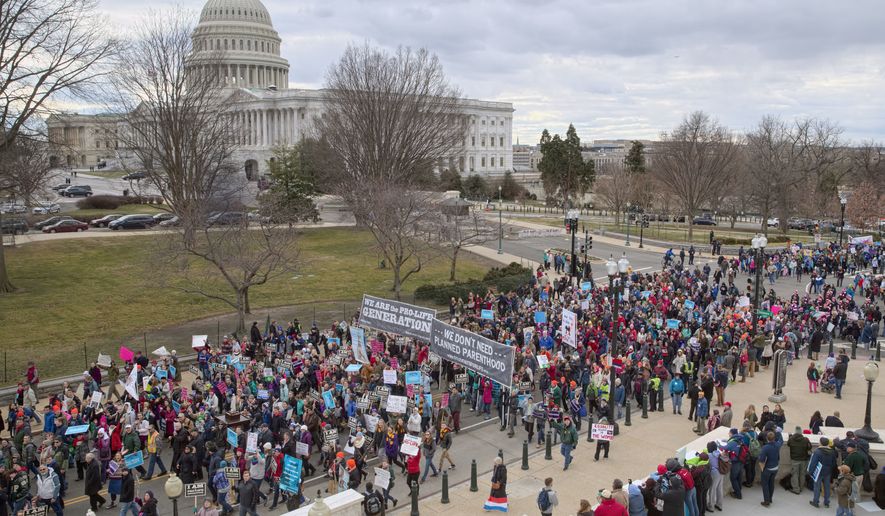As pro-life marchers descend on Washington on Friday they are confronting a new battlefield in the abortion debate, having to fend off increasing challenges to a decades-old agreement that acknowledged while abortion may be legal, taxpayers shouldn’t be forced to pay for a procedure that many of them find abhorrent.
Democrats have made breaking the 42-year-old policy, known as the Hyde Amendment, a top political priority as they reach to regain political control in Washington.
The taxpayer issue is also being tested in the courts, where the Trump administration is battling the American Civil Liberties Union’s efforts to force the government to facilitate abortions for illegal immigrant teens caught sneaking into the U.S.
The court fight has particularly unnerved pro-life groups, who fear the U.S. would become an abortion sanctuary for migrants who can’t terminate their pregnancies in their home countries.
“There are many great reasons to immigrate to the United States, but abortion should not be one of them,” said Kristan Hawkins, president of the Students for Life of America, which will join tens of thousands of other pro-life demonstrators at the annual March for Life in Washington.
The Trump administration has asked the Supreme Court to weigh in on the immigration fight, but most of the action has been on Capitol Hill, where the Hyde Amendment was adopted in 1976 and has been a constant in the fractious abortion debate.
It bans the use of federal funds for abortion except to save the life of the mother, or if the pregnancy is the result of rape or incest. The prohibition covers multiple federal programs, including Medicare and coverage through the Indian Health Service. President Obama agreed to extend it to subsidized coverage under the Affordable Care Act of 2010 — although pro-life advocates say the law made an end-run around Hyde.
Congress routinely renews the ban each year as a policy add-on to spending bills. Yet the long-standing compromise was tested in 2016, when Democrats included language in its party platform to repeal Hyde.
Since then, 128 House Democrats — about two-thirds of the caucus — have co-sponsored a bill by Rep. Barbara Lee of California to nullify Hyde restrictions.
“There is significant momentum across the country not only to stop lawmakers from making the Hyde Amendment permanent, but to lift harmful abortion coverage bans once and for all. No one should be denied abortion care just because they’re poor,” said Jennifer Dalven, director of the Reproductive Freedom Project at the American Civil Liberties Union, which advocated on behalf of the illegal immigrant women seeking abortions.
Yet 3 in 5 Americans oppose using tax dollars for abortion, according to a Marist Poll released this week, so pro-life advocates say any push to water down Hyde misreads the American public.
“I don’t see a lot of these so-called moderate Democrats talking about forcing their constituents to pay for abortions. I think they’d rather not talk about it,” said David Christensen, vice president of government affairs for the Family Research Council, a conservative think tank.
As it stands, Republicans hold both chambers of Congress and the White House, yet Democrats hold enough Senate seats to filibuster legislation. The upshot is a likely continuation of the Hyde compromise.
“I think it’s going to continue,” said Rep. Michael C. Burgess, Texas Republican. “Democrats will not let it be codified, we can’t start to let things go without it — so there you have it.”
Pro-life groups aren’t satisfied with the status quo, however.
The Republican-led Congress still hasn’t defunded Planned Parenthood over its abortion practice, and Tom McClusky, vice chairman of government affairs for the March for Life, said Democrats “scored a big pro-death victory” by passing the Affordable Care Act in 2010.
Obamacare’s framers agreed to prohibit the use of premium subsidies to fund abortions directly, setting up a system in which a $1 surcharge is attached to plans that cover the procedure. But critics say taxpayers are still subsidizing insurance that puts abortion within reach.
“It’s the idea that money is fungible — that’s the basic idea. But for the subsidies, these people wouldn’t be able to afford these plans,” Laurie Sobel, associate director for women’s health policy at the nonpartisan Kaiser Family Foundation, said in describing pro-life groups’ complaints.
Republican attempts to repeal and replace Obamacare imploded last year, so “those pro-life concerns remain,” Mr. McClusky said.
For now, Congress is debating whether to stabilize Obamacare’s wobbly markets by restoring “cost-sharing reductions” to insurers, raising another red flag among pro-life groups, who want House Republicans to stand tall against the plan known as Alexander-Murray.
“The CSR debate is exposing pro-life weaknesses in the Senate, even amongst Republicans,” Mr. McClusky said. “During the original debate last year, too many Republicans in the Senate were ready to pass a replace bill that did not have proper pro-life protections.”
Ms. Sobel said Obamacare did, however, prompt states to enact pro-life protections on their own. So far, 26 states have barred plans that cover abortion from being sold on their respective Obamacare exchanges.
Some blue states are heading in the opposite direction, expanding the reach of state-funded access to contraception and abortion as Republicans in Washington eye restrictions.
The ACLU said progressive groups will try to leverage backlash against Mr. Trump, particularly his stances on health care and immigration, to build on those gains at the federal level.
“People understand that whether we are talking about preventing immigrant women from getting the care they want, allowing employers to take away insurance coverage for contraception or banning coverage for abortion for women who qualify for Medicaid, they are all efforts by the government to take this decision away from women,” Ms. Dalven said.
• Tom Howell Jr. can be reached at thowell@washingtontimes.com.




Please read our comment policy before commenting.